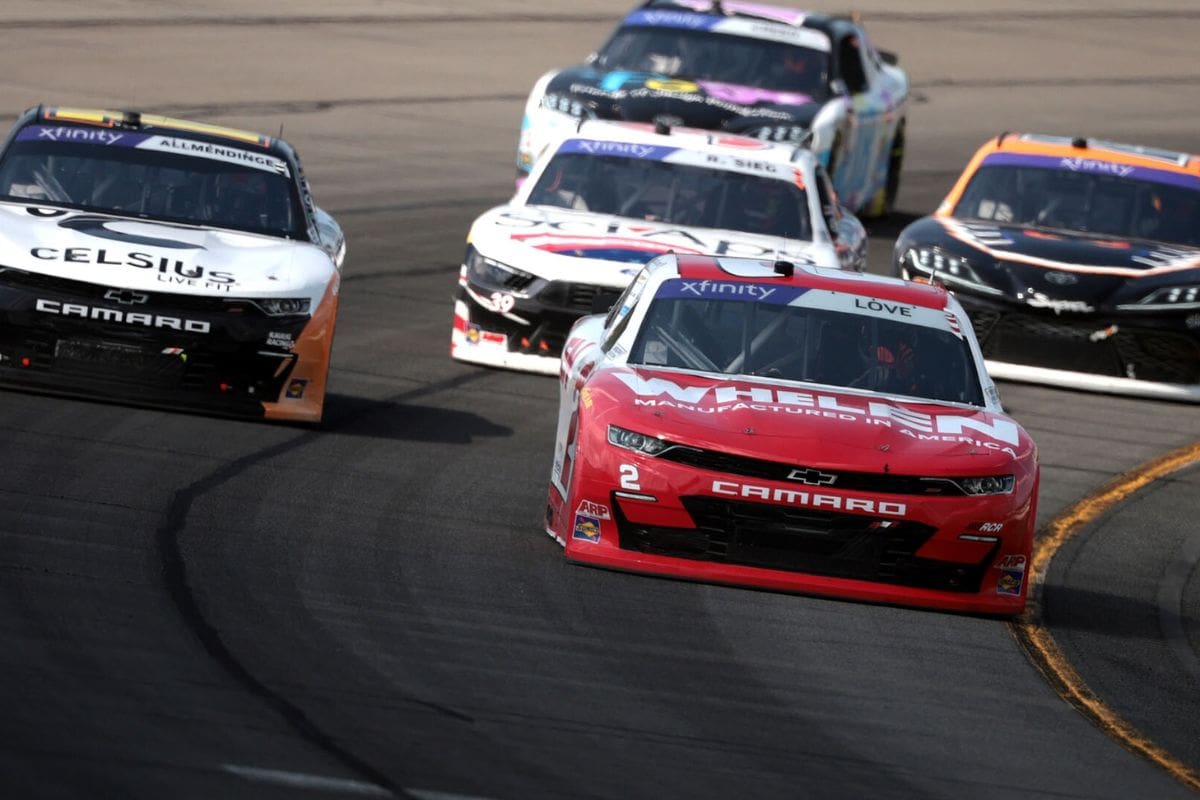Dale Jr. Endorses Denny Hamlin’s Controversial Move: Dale Earnhardt Jr.‘s endorsement of Denny Hamlin‘s approach at Pocono, asserting that “It’s not a mistake,” offers a compelling perspective on the intricacies of NASCAR race strategies. This support sheds light on the importance of tactical decision-making in the quest for championship points over immediate victories. Earnhardt Jr.’s backing validates Hamlin’s approach, emphasizing the broader, long-term objectives that often govern a driver’s choices. As we assess Hamlin’s performance and look toward upcoming races like the Brickyard 400, the implications of such strategic endorsements become increasingly crucial.
Key Highlights
- Dale Earnhardt Jr. supports Denny Hamlin’s decision to prioritize stage points at Pocono.
- Earnhardt Jr. believes Hamlin’s strategy aligns with long-term championship goals.
- The endorsement highlights the calculated decision-making in Hamlin’s approach.
- Earnhardt Jr. emphasizes that prioritizing points over a risky win is not a mistake.
- The backing adds credibility to Hamlin’s strategic race planning.
NASCAR Strategy and Points System
How does the intricate balance between race wins and point accumulation shape a team’s approach in the world of NASCAR?
In the NASCAR Cup Series, the pathway to the championship is paved with both immediate and long-term calculated decisions. Central to this is the dual focus on securing race victories and accumulating points. Each race offers the opportunity for substantial points, distributed based on finishing positions and performance in individual stages of the race. This dual system ensures that consistency throughout the season is as crucial as securing checkered flags.
Winning a race provides an immediate, substantial points increase and virtually guarantees a spot in the playoffs. However, the points system, which rewards points for finishing positions and stage performances, incentivizes consistency. A racer who consistently finishes in the top ten, collects stage points, and avoids poor finishes can accumulate sufficient points to be a strong contender come playoff time, even without frequent wins.
The calculated decision-making becomes complex when teams must decide whether to push aggressively for a win or adopt a more conservative approach to secure steady point collection. Aggressive strategies risk crashes or mechanical failures, leading to zero points for that race. Conversely, a cautious strategy might forego a potential win but secures valuable points.
This balance demands that teams constantly evaluate race-day circumstances—such as track conditions, competitor behavior, and real-time performance data. Ultimately, while a win is glamorous and pivotal, calculated point accumulation over a demanding season can be the cornerstone of a successful championship campaign.
This strategic tension was notably highlighted in the recent debate surrounding the Pocono race, where choices made on the track reverberated through the broader conversation about ideal racing strategies.
Denny Hamlin’s Performance at Pocono and Strategic Debate
Denny Hamlin’s performance at Pocono has sparked a tactical debate, especially considering Dale Earnhardt Jr.’s endorsement of his prioritization of stage points over a potentially riskier win. Hamlin’s decision to focus on accumulating stage points is under analysis, as many believe a more aggressive approach could have secured him his eighth victory at the ‘Tricky Triangle‘. However, Earnhardt Jr. maintains that in the broader scope of the championship, Hamlin’s approach was justified.
Hamlin’s race was characterized by strong performance and calculated choices that placed him in contention throughout the event. The climax came with Ryan Blaney taking the checkered flag amidst a dramatic ending featuring a multi-car crash, relegating Hamlin to a runner-up finish. This result has led to questions about whether a different tactical decision might have altered the race’s final standings.
In NASCAR’s points system, stage points play a critical role in the overall championship picture. By prioritizing these points, Hamlin secured a steady accumulation that could be crucial as the season progresses. The decision aligns with a long-term vision, potentially sacrificing a single race victory for a more sustainable approach to the championship.
The debate highlights the complexity of race strategy in NASCAR. While fans and analysts may yearn for the thrill of a more aggressive push for the win, the calculated approach taken by Hamlin and his team exemplifies a deeper understanding of championship dynamics. In this context, Earnhardt Jr.’s stance supports a perspective that values consistency and strategic foresight, even in the face of immediate disappointment.
Chris Gabehart’s Perspective and Team Strategy
In analyzing Chris Gabehart’s perspective, it becomes evident that the crew chief prioritized accumulating points to position Denny Hamlin tactically for the championship. Despite the apparent tactical mistake that cost Hamlin the race win at Pocono, Gabehart’s focus was on the broader objective of securing a strong points tally. This approach is vital given Hamlin’s recent race outcomes, which included finishes of 38th, 24th, and 12th.
Gabehart’s strategy aimed to mitigate these setbacks by ensuring a substantial points gain, which is necessary for the championship standings. Gabehart articulated his satisfaction post-race, emphasizing the significance of the points accrued. He stated, “Yeah, it’s a big deal to your point, We’ve had a lot of struggles, and everyone does. But with results, we should have quite a few more points in the bucket than we do at this point. So to take a big chunk out of the points lead, have a solid day heading into, in the 11 car’s opinion, probably the most important race of the year.”
This perspective highlights several key aspects:
- Resilience: Gabehart’s strategy was a response to the recent adversities faced by the team.
- Long-term Vision: Prioritizing points over a single win reflects a calculated approach to the season.
- Championship Focus: Accumulating points is pivotal for securing a favorable position in the championship.
- Team Morale: Achieving a solid points day can enhance the team’s confidence and momentum.
Dale Earnhardt Jr.’s Analysis and Factors in Race Strategy
Dale Earnhardt Jr.’s analysis further highlights the tactical depth involved in race decisions, emphasizing how prioritizing points over a single race win can be a sound approach for drivers like Denny Hamlin.
In the competitive landscape of NASCAR, where the season-long accumulation of points can ultimately determine a driver’s success, making strategic choices that may sacrifice a win but secure valuable points often pays dividends in the long run.
Earnhardt Jr., speaking on the Dale Jr. Download episode aired on July 16th, emphasized the importance of this broader perspective. He stated, “I think..you know it’s not a mistake, by Denny and those guys. I mean they were in second. Things could have worked out to where they got the stage points they were trying to commit to and win the race.” This insight reveals the intricate balance that teams must navigate between immediate race outcomes and their long-term championship aspirations.
Denny Hamlin’s decision at Pocono to focus on securing stage points, rather than solely aiming for the race win, exemplifies the nuanced strategies employed by top-tier drivers and their teams. This approach is not merely about the immediate race but about positioning oneself favorably in the comprehensive standings.
Moreover, Earnhardt Jr.’s endorsement of Hamlin’s move highlights the veteran driver’s deep understanding of the sport’s strategic complexities. It serves as a reminder that NASCAR is as much about strategic foresight as it is about speed and skill on the track. The decision to prioritize points reflects a sophisticated, long-term view that is vital for sustained success in the sport.
“What if you give up that (stage points) and then somehow you have a little mistake on the pit stop or something late in the race and you lose one or two spots?” – dale jr
Looking Ahead to the Brickyard 400 and Hamlin’s Strategy
As NASCAR heads to Indianapolis for the next Cup series race, the Brickyard 400 will be a decisive test of tactical expertise for Denny Hamlin, who aims to close the 20-point gap behind Chase Briscoe. Hamlin, a seasoned veteran on the circuit, has yet to secure a win at the Brickyard—a feat that could dramatically alter the current standings and his championship aspirations.
The Brickyard 400 is renowned for its calculated complexity. Hamlin himself has emphasized the importance of qualifying well and executing a meticulous race plan. “It will be an execution-type race; you’ll need to qualify well, but you just never know what can happen. Strategy is a big thing there,” Hamlin noted during a recent press conference.
“There will be similarities for sure. Alot of it is because of the long straightways, the corners, the angle of the corners are not all that different.” – Hamlin
- Anticipation of a career-first win at the Brickyard: For Hamlin, conquering this iconic track would be a monumental achievement.
- The pressure of narrowing a 20-point deficit: Every decision will be vital in edging closer to Chase Briscoe.
- Unpredictability factor: The race’s dynamic nature means strategy must be adaptable to unforeseen circumstances.
- Legacy implications: A win here could further solidify Hamlin’s status as one of NASCAR’s elite drivers.
As the race unfolds, the spotlight will be on how effectively he can navigate the complexities of the Brickyard 400 and utilize his skillset to potentially secure a decisive victory.
News in Brief: Dale Jr. Endorses Denny Hamlin’s Controversial Move
The endorsement by Dale Earnhardt Jr. of Denny Hamlin’s calculated decision at Pocono emphasizes the complex nature of NASCAR race strategies and the prioritization of points over immediate wins for long-term championship aspirations. Earnhardt’s support strengthens the credibility of Hamlin’s approach.
This shows the tactical depth widespread within NASCAR, as drivers and teams consistently weigh immediate risks against broader competitive objectives.
ALSO READ: Denny Hamlin Discloses Costs of Running a NASCAR Car: “18M Dollars a Year to Run a Car”



